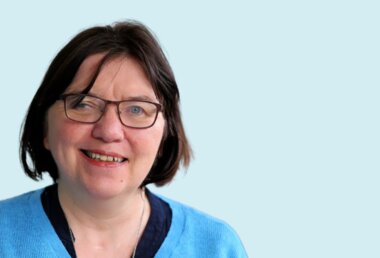4 October 2023
The KHP Neurosciences patient representative on how helping others going through similar experiences has helped her with her own recovery.
What is your background?
I’m a fully-qualified marketing practitioner with thirty years of experience working in media and marketing. I’m also a wife and mother of two adult daughters.
I had a cerebral stroke, a brain haemorrhage, aged 44 while I was relatively fit and healthy. I was transferred to King’s College Hospital at Denmark Hill for their specialist input from a local hospital in Tunbridge Wells, Kent. While I was an in-patient at King’s College Hospital I suffered a secondary stroke. Encephalitis led me to need a craniotomy – where part of the skull is removed to accommodate my swelling brain. My operation was undertaken by Dr. Peter Bentley.
After the operation, I spent a year in West Kent Neuro Rehab hospital, Sevenoaks, Kent where I received intensive rehab input for: physio, speech & language therapy, and occupational therapy.
Finally, I was discharged for Christmas 2011/12. I returned home with full-time, live-in care in place. I remained left-side- paralysed, peg-fed and partially-sighted post-stroke. In 12 years of recovery since, I’ve worked very hard to relearn walking with a stick. Thankfully, my swallow-reflex returned on my return home to my family.
Why did you want to be involved as a patient representative for KHP Neurosciences?
I wanted to be a patient representative because it helps me to come to terms with my situation by using my experience to help others, the survivors of the future. I can use my communication skills to tell my story for others to learn from me.
I also co-ordinate West Kent Different Strokes Peer Support Group on behalf of the national charity differentstrokes which supports survivors of stroke at working-age (15-65).
What would your advice be to anyone else thinking of being a patient representative?
I think that it is important for any patient representative to have reached a point where they are comfortable with their condition and can find positives to share with NHS institutions as co-production associates.





